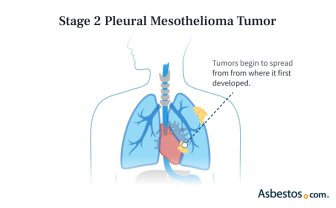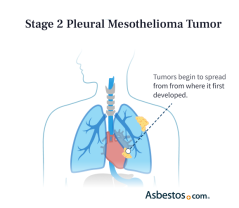
Connect with top-rated doctors specializing in mesothelioma treatment, who will personalize treatment options based on your diagnosis.
Find Your DoctorStage 2 mesothelioma is an early cancer stage when cancer cells may not have spread far but are entering nearby lymph nodes. Stage 2 prognosis may still be favorable, and many treatment options are available to extend life expectancy. The 2-year survival rate at this stage is around 38%.

Exclusive Content
Dr. Jacques Fontaine: Best Candidates for Mesothelioma Surgery
"The Patient Advocates are absolutely amazing and helpful! I ..." see more
Pamela K. - Mesothelioma Patient
"I found out about The Mesothelioma Center while researching ..." see more
Karen F. - Mesothelioma Patient
"I reached out and talked to Aaron a couple of weeks before m..." see more
Stan B. - Mesothelioma Patient
"My brother was recently diagnosed with mesothelioma. I began..." see more
Cindy W. - Sister of a Mesothelioma Patient
"My Dad was diagnosed with mesothelioma, and thankfully The M..." see more
Patrick K. - Son of a Mesothelioma Patient

Exclusive Content
Dr. Jacques Fontaine: Best Candidates for Mesothelioma Surgery


Stage 2 pleural mesothelioma means your cancer has spread outside the original location where it first developed. Tumors spread in deep tissue near the original site and may invade your nearby lymph nodes, such as hilar lymph nodes. These lymph nodes, also known as N1 lymph nodes, are located at the root of your lung.
The main difference between stage 2 and stage 1 pleural mesothelioma is tumor cells in your hilar lymph nodes. In stage 1, cancer cells haven’t yet reached any lymph nodes. Tumors in stage 2 may or may not have grown into your diaphragm or lung tissue. If you’re in otherwise good health, you may be eligible for an aggressive treatment plan in stage 2.
“The stages of the disease progress from stage 1 to stage 4. Stages 1 and 2 are considered early-stage mesothelioma,” explains Sean Marchese, registered nurse and oncology writer at The Mesothelioma Center.
Peritoneal mesothelioma has no formal staging system. Doctors often define this type of mesothelioma as stage 2 if there is local tumor growth involving the lymph nodes.
In most cases, mesothelioma cancer symptoms aren’t present in stage 2. When people do notice symptoms, they’re typically minor. Symptoms may be mistaken as signs of a less severe illness such as flu, pneumonia or bronchitis.
Tumor growth or a fluid buildup in the pleura may cause pain and other symptoms as the lungs constrict. These symptoms become more frequent with stage 3 or stage 4 disease.
Symptoms of Stage 2 Mesothelioma
“So the symptoms of mesothelioma vary greatly from the time of the initial presentation until we see the patients,” Dr. Marcelo DaSilva, chief of thoracic surgery and medical director at AdventHealth Cancer Institute, tells us. “Most commonly, the patients present with cough, shortness of breath, difficulty in walking, loss of stamina.”
Stage 2 mesothelioma is challenging to diagnose because it has a long latency period. Decades pass between initial asbestos exposure and cancer development. Once tumors develop, they can multiply without causing symptoms until stages 3 or 4.
Doctors most often diagnose mesothelioma cases after the cancer has already spread beyond stage 2. The Mesothelioma Center’s 2025 patient survey found 8% of respondents were diagnosed with stage 2 mesothelioma. While only 22% of respondents in our survey were diagnosed with stage 1 or 2 mesothelioma (early stage), 50% were diagnosed with stage 3 or 4 (late stage).

Connect with top-rated doctors specializing in mesothelioma treatment, who will personalize treatment options based on your diagnosis.
Find Your DoctorMedian life expectancy for stage 2 mesothelioma patients is 1 to 2 years. About 38% of stage 2 mesothelioma patients survive for at least 2 years, and 11% live for 5 years or more. Survival rates underscore the seriousness of this diagnosis, but they can’t predict the outcome for an individual.
Each mesothelioma survivor’s life expectancy depends on many factors. Their overall health and the specific cancer cell type are essential in determining treatment options and effectiveness. People with stage 2 peritoneal mesothelioma tend to have better survival rates than those with pleural disease.
What are the differences between early-stage and late-stage cancer?
[MUSIC PLAYING] Early stage cancer diagnosis will provide a lot of options for the patient. An early stage patient might be eligible for surgery, such as having that pleura removed, or extrapleural pneumonectomy, which means having the entire lung removed. Early stage means that the cancer is contained within the primary location of the diagnosis, hasn’t gone beyond that primary location. So that means lymph nodes aren’t involved, the chest wall is not involved. Late stage means that there’s a lot more things involved in the cancer. It’s gone beyond that primary location. It doesn’t mean that there’s not treatment options, it just means it’ll be a different course, perhaps surgery won’t be the first thing that is offered to the patient. [MUSIC PLAYING]
Stage 2 mesothelioma treatment options include chemotherapy, immunotherapy, surgery, and radiation. Doctors also use multimodal therapy, which combines treatments. The best combination of treatments will differ for each patient.
“In some cases, we’ll provide the patients with an option for immunotherapy, although reserved for a few patients,” Dr. DaSilva shares with us. “We can also provide palliative surgery for patients in which they can get relief of their symptoms and then be treated in a multimodality, multispecialty protocol.”
Treating Stage 2 Mesothelioma
A study published in MDPI in 2022 of pleural mesothelioma patients at stages 1 and 2 found multimodal therapy safe and effective at improving survival. Participants underwent induction chemo, surgery, postoperative radiation therapy and chemo.
Researchers reported a median overall survival of 32.1 months. That figure surpassed the average 12-month survival. Clinical trials also offer experimental treatments such as immunotherapy.
Unfortunately, no stage of mesothelioma is curable. However, therapies can control it to help people live longer. In our 2025 survey, 8% of pleural patients and 16% of peritoneal patients had experienced remission.
Pleural mesothelioma is an aggressive disease. Stage 2 mesothelioma has a better prognosis than more advanced stages of the cancer. New drugs and treatment approaches are helping patients manage this cancer as a chronic disease rather than a terminal illness.
Patients with stage 2 peritoneal mesothelioma may be eligible for surgery. They may also qualify for hyperthermic intraperitoneal chemotherapy. This treatment is also known as HIPEC. About 50% of peritoneal patients who receive HIPEC survive 5 years after diagnosis.

Cheryl Pilkington
Pleural Mesothelioma Survivor Diagnosed in Stage 2
As a child, Cheryl Pilkington played in plaster dust at her father’s foundry, unaware it contained asbestos. She was diagnosed with stage 2 pleural mesothelioma 60 years later. Under the care of Dr. Matthew Steliga at the Winthrop P. Rockefeller Cancer Institute, she underwent aggressive pleurectomy and decortication surgery that helped stop her tumor growth.
Cheryl Pilkington
The prognosis for stage 2 mesothelioma is more favorable than for those diagnosed at later stages. However, because this is an aggressive cancer, most patients live for 1 to 2 years after diagnosis.
Doctors consider stage 2 mesothelioma as an early-stage disease and more eligible for curative treatments such as surgery, immunotherapy and chemo. Curative treatments are therapeutic options that can extend survival.
A multimodal treatment approach is the most common and effective therapeutic option for most stage 2 mesothelioma patients. Physicians often take a multimodal approach and use multiple therapies, such as surgery and chemo, to decrease the chance of cancer recurrence.
Some screening tests, such as chest X-rays, CT scans and PET scans, can detect early-stage mesothelioma before symptoms develop. If you have a known history of asbestos exposure, telling your doctor can ensure you receive screenings for mesothelioma and other asbestos-related diseases.
Stay up-to-date on treatment, research, clinical trials, doctors and survivors
The information on this website is proprietary and protected. It is not a substitute for professional medical advice, diagnosis or treatment. Any unauthorized or illegal use, copying or dissemination will be prosecuted. Please read our privacy policy and terms of service for more information about our website.
This website and its content may be deemed attorney advertising. Prior results do not predict a similar outcome.
The Mesothelioma Center’s claim as the most trusted resource is based on our more than 150 5-star Google and BBB reviews. Our organization also helps more than half of all mesothelioma patients annually diagnosed.
Your web browser is no longer supported by Microsoft. Update your browser for more security, speed and compatibility.
If you are looking for mesothelioma support, please contact our Patient Advocates at (855) 404-4592
Selby, K. (2026, February 13). Stage 2 Mesothelioma. Asbestos.com. Retrieved March 3, 2026, from https://www.asbestos.com/mesothelioma/stage-2/
Selby, Karen. "Stage 2 Mesothelioma." Asbestos.com, 13 Feb 2026, https://www.asbestos.com/mesothelioma/stage-2/.
Selby, Karen. "Stage 2 Mesothelioma." Asbestos.com. Last modified February 13, 2026. https://www.asbestos.com/mesothelioma/stage-2/.
The Mesothelioma Center at Asbestos.com has provided patients and their loved ones the most updated and reliable information on mesothelioma and asbestos exposure since 2006.
Our team of Patient Advocates includes a medical doctor, a registered nurse, health services administrators, veterans, VA-accredited Claims Agents, an oncology patient navigator and hospice care expert. Their combined expertise means we help any mesothelioma patient or loved one through every step of their cancer journey.
More than 30 contributors, including mesothelioma doctors, survivors, health care professionals and other experts, have peer-reviewed our website and written unique research-driven articles to ensure you get the highest-quality medical and health information.
My family has only the highest compliment for the assistance and support that we received from The Mesothelioma Center. This is a staff of compassionate and knowledgeable individuals who respect what your family is experiencing and who go the extra mile to make an unfortunate diagnosis less stressful. Information and assistance were provided by The Mesothelioma Center at no cost to our family.
Lashawn , Mesothelioma patient’s daughter


We Thoroughly vet individuals who are experts in their field to contribute to articles on Asbestos.com. We believe in the integrity and quality of our educational materials, and only publish information that is relevant, factual, and backed by experts.


Dr. Jacques Fontaine is a thoracic surgeon at Moffitt Cancer Center in Tampa, Florida, where he heads up the Mesothelioma Research and Treatment Center. He specializes in minimally invasive robotic surgery and aggressive surgeries for mesothelioma.
Our fact-checking process begins with a thorough review of all sources to ensure they are high quality. Then we cross-check the facts with original medical or scientific reports published by those sources, or we validate the facts with reputable news organizations, medical and scientific experts and other health experts. Each page includes all sources for full transparency.
Please read our editorial guidelines to learn more about our content creation and review process.
